

|
Chapter
11 Fort Duncan 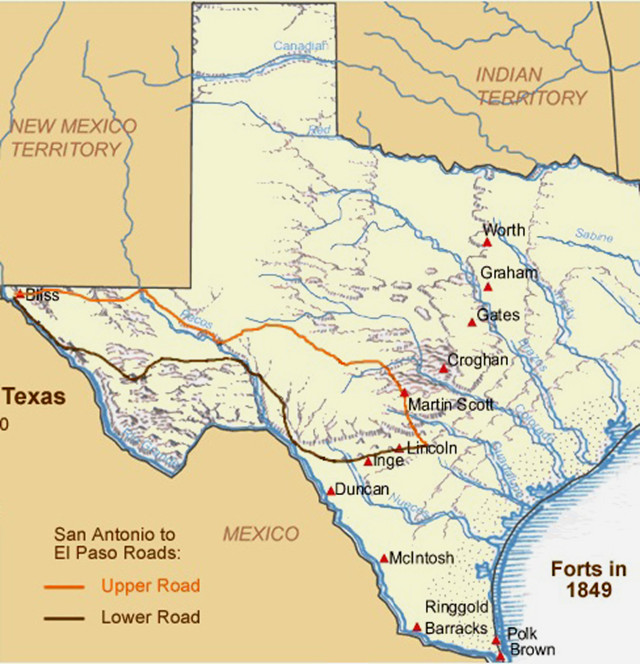 During the first week of April,
Captain J. B. Weyman was the commander of a small Confederate garrison
at Fort Duncan, which James would soon be ordered to assume authority
over. Weyman “reported chasing
various bands of Union guerrillas into Mexico. Weyman complained
that Francisco Garcia, comandante at Piedras Negras, had promised to
apprehend the raiders” but failed to cooperate. (Ref.
3347) The following letter was written on April 23, 1864,
by James Ware to the same commander in Mexico. It is an excellent
example of how James could use his legal skills as a writer.
165 Headquarters Fort Duncan, Texas
April 23, 1864 Commanding Officer Piedras Negras, Republic of Mexico I regret that
it becomes my duty to call your attention to an act of open hostility
to my Government, perpetrated so openly within the limits of your
authority as to tender it almost impossible that it could have escaped
your attention or that of your authorities. A number of persons
formerly residing in Texas have taken refuge from the just penalty of
their crimes – have passed beyond the jurisdiction of the Confederate
States into that of the Mexican Republic and are organized to invade
this state. In relinquishing the right to pursue these felons to
punishment wherever found, the Confederate States have but made a just
concession of respect to the sovereignty of Mexico, having full
confidence that the comity which has always existed between the two
nations and the friendly spirit which has characterized their
intercourse and the vital interests of a trade mutually beneficial
would be sufficient guarantee that such a course of conduct would be
pursued by all officials of that illustrious Republic as to insure and
maintain the good feeling and sense of national justice which has thus
far supplied the obligation of formal treaties.
I
am now, however, informed that a person calling himself McManus is
openly recruiting soldiers for the invasion of the Confederate States,
and supplying these soldiers with rations from a store of provisions
established for that purpose within the limits of your authority; that
this so-called McManus has been permitted to open and read letters
addressed by citizens of the Confederate States to their agents and
friends and entrusted for safety to the sanctity of your posts, and
this in his well-known capacity of recruiting agent and spy of the
Unites States Government. A band of these thieves and renegades,
organized under the protection of your national flag, recently (feeling
themselves safe in doing so, from the well-known disposition of the C.
S. authorities to respect the sanctity of the flag and territory of
Mexico, and the confidence of that Government in the ability and
disposition of Mexican officers to
166prevent
these outrages upon national good fellowship) crossed to this side of
the river and stole and carried away eight horses engaged in carrying
the C. S. mail from San Antonio to this place, and these horses,
although identified by the owner and having no other claimant, are
still withheld from restitution.
I have now
information, which I deem reliable, that the aforesaid renegades are
armed, equipped and organized to invade the territory of the
Confederate States. You cannot expect, with the disposition
evinced by these repeated acts of hostility, the friendly relations
existing between us can be long maintained, and I therefore consider it
my duty in view of the facts I have mentioned, and the facility with
which any such expedition as that I have mentioned could be discovered
and frustrated by your authorities if they had the disposition to do
so, and their obligations to notify you that should any such band cross
the Rio Grande it will be considered an act of declared hostility on
your part; and however I may regret a rupture of our present amicable
relations, I can but feel that the authorities of the Confederates
States have done everything in their power to prevent such a result.
Respectfully,
your obedient servant
James A. Ware Captain, First Texas Cavalry Commanding Post Above was found in: WAR OF THE REBELLION – EAGLE PASS/FORT DUNCAN/AND PIEDRAS NEGRAS A MONOGRAPH BY A. RAY KINSALL MARCH 27, 1999 It was clear that by the end of
April, James was the new Commander of Fort Duncan. There began an
almost constant exchange of correspondence between James and his
superiors.
167 Fort Duncan,
Texas April 25, 1864
Captain James A. Ware Transmitting dispatches to General Slaughter Filed at the rebel archives War Department (Ref. 2178) 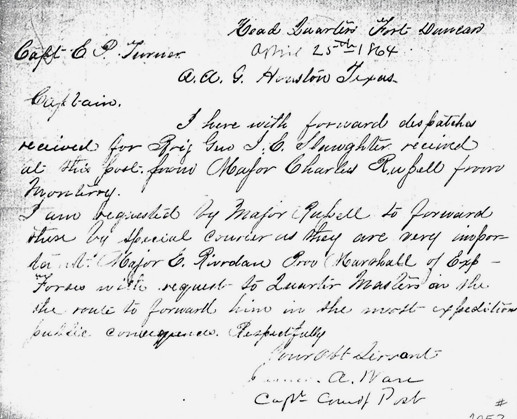
Headquarters
Fort Duncan April 25,
1863 (Ref. 2052, 3210)
Capt. E. P. Turner A.A.G. Houston, Texas Captain: I herewith forward dispatches received for Brig. Gen. J. E. Slaughter received at this post from Major Charles Russell from Monterry. I am requested by Major Russell to forward them by special courier as they are very important - Major E. Riordan Provost Marshall of Exp. Forces with request to Quarter Master on the route to forward him in the most expeditious public conveyances. Respectfully, Your Obedient Servant James A. Ware Capt. Commander of Post 168 During this time, there was
another shuffle of companies and leaders. The original unit was
attached to General Hamilton Bee's Brigade and fought at the battles of
Mansfield and Pleasant Hill. The field officers were Colonel
August Buchel, Lieutenant Colonel William O. Yager, and Major Robert A.
Myers. However, “all of the 1st
Texas Cavalry did not join Bees’s Brigade. Magruder had sent Capt.
James A. Ware and an undetermined number of his men to
Fort Duncan, near Eagle Pass to search for deserters. Although he
had orders from Buchel to join the regiment as soon as possible, Ware and
his detachment remained near Eagle Pass until at least August 1864.”
(Ref. 721) The following pieces of
correspondence come from that time frame when James was the Commander
of Fort Duncan.
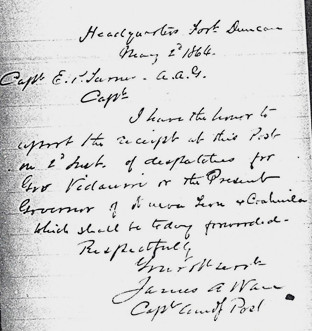 Original Headquarters Fort Duncan
May 2, 1864 Captain E. P. Turner A.A.G. Captain - I have the honor to report the receipt at this Post on 2nd instant of dispatches for Governor Vidaurri or the present Governor of Nuevo Leon and Coahuila which shall be today forwarded. Respectfully, Your obedient Servant, James A. Ware, Captain Commanding Post (Ref. 2051) 169 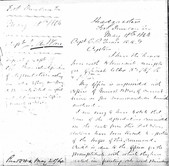 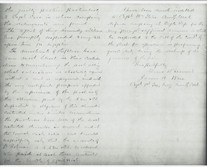 Original dated May 18, 1864 Headquarters
Ft. Duncan,
Texas
May 18, 1864
Captain E.P. Turner A.A.G. Captain I have the honor herewith to transmit receipt for official letters numbers 969 and 959. My office is unprovided with copies of general orders of current series, as per recommendation herewith enclosed. I am sorry to have to state that some of the depredations committed on the route from this post to San Antonio have been traced to a portion of the troops of this command. Credit is due to the officers for the promptitude with which they have acted in ferreting out and punishing the guilty parties - particularly to Captain Carr in whose company the delinquents were found. The agent of King, Kennedy, and -- has promptly responded to my call upon him for supplies. The merchants of the place have been most liberal in their contributions to maintain the post - selling what subsistence we absolutely require without a cent in payment and with the very indefinite prospects afforded by the experience of the post of the attention paid by the Quartermaster and C. S. Department to obligations of this character contracted under similar circumstances. The purchases have been of the most restricted character in amount and at the lowest cash rates and I would respectfully ask that the accounts of Lt. Robinson A.A.QM and C.S. be ordered to be paid - at least those contracted for the month of April last. I have been much indebted to Capt. William Stone, commander of local defense company at Eagle Pass, for the very prompt and efficient manner in which he responded to the call of the commander of the post for assistance in performing guard duty during the weakness of the garrison of the post. Respectfully,
Your Obedient Servant
James A. Ware
Captain, 1st Texas Cavalry, Commander of Post
(Ref. 2079)
170
The following letter written by James on May 27, 1864, paints a vivid
picture of how strongly he felt against the policy of pardoning
deserters and allowing them to rejoin the army. His scathing
comments left little to the imagination, and it would be impossible not
to sense his frustration over requests made to Headquarters that were
repeatedly denied.
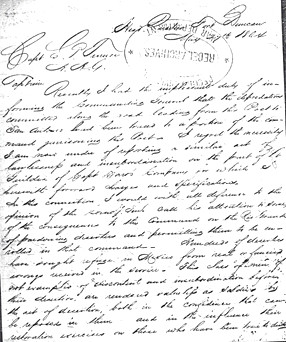 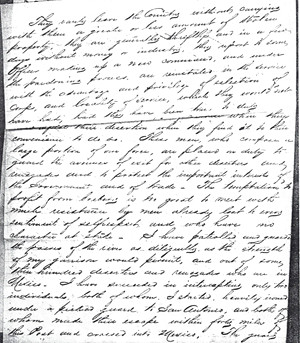 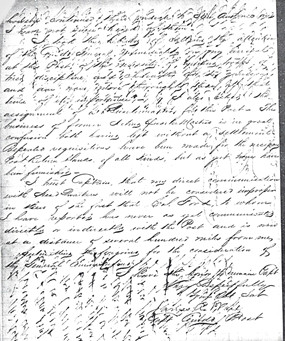 Letter from Capt. James Alexander Ware to Capt. E. P. Turner dated May 27, 1864
Headquarters Fort Duncan
May 27, 1864 Captain E.P. Turner A.A.G. Captain, Recently I had the unpleasant duty of informing the Commanding General that the depredations committed along the road leading from this Post to San Antonio had been traced to a portion of the command garrisoning this post. I regret the necessity I am now under of reporting a similar act of lawlessness and insubordination on the part of Lt. Guilden of Capt. Carr’s Company for which I herewith forward charges and specifications. In this connection I would, with all deference to the opinion of the Commanding General, call his attention to some of the consequences to the Command on the Rio Grande of pardoning deserters and permitting them to be 171
enrolled in that command. Hundreds of deserters have sought
refuge in Mexico from real or fancied wrongs received in the
service. This class of men, if not examples of discontent and
insubordination before their desertion, are rendered valueless as
soldiers by the act of desertion, both in the confidence that can be
placed in them and in the influence their restoration exercises on
those who have been true to duty. They rarely leave the country
without carrying with them a greater or less amount of stolen
property. They are generally shiftless and in a few days without
money or industry, they report to some officer making a new Command and
under the pardoning process are reinstated in the service with the
advantage and privilege of selection of corps and locality of service
which they would not have had had they have been true to
duty. __their desertion when they find it to their
convenience to do so. These men, who compose a large portion of
our force, are placed on duty to guard the avenues of exit for other
deserters and renegades and to protect the important interests of the
Government and of trade. The temptation to profit from bribing is
too great to meet with much resistance by men already lost to every
sentiment of self respect and who have no character at stake. I
have patrolled and guarded the passes of the river as diligently as the
strength of my garrison would permit, and out of some 300 deserters and
renegades who are in Mexico I have succeeded in intercepting only two
individuals, both of whom I started, heavily ironed under a picket
guard, to San Antonio and both of whom made their escape within 40
miles of this post and crossed into Mexico. The guard, however,
continued to proceed to San Antonio. I have not since heard of
them.
I took the liberty of calling to the attention of the Commanding General immediately on my arrival at this post of the necessity of recruiting troops of tried discipline and character for its garrison and am now more thoroughly at that time of its importance. I also asked the assignment of a Quartermaster for this post. The business of former Acting Quartermasters is in great confusion, both having left without a settlement. Repeated requisitions have been made for the 172
necessary post return blanks of all kinds, but as yet have not been
furnished. I trust, Captain, that my direct communication with
Headquarters will not be considered improper in view of the fact that
Col. Ford, to whom I have reported, has never as yet communicated
directly or indirectly with the Post and is now at a distance of
several hundred miles from me.
Submitting the foregoing for the consideration of the General Commanding, I have the honor to remain, Captain, Very Respectfully, James A. Ware Captain Commanding Post (Ref. 2079) His letter must have made some impact
somewhere because he shortly received the following message.
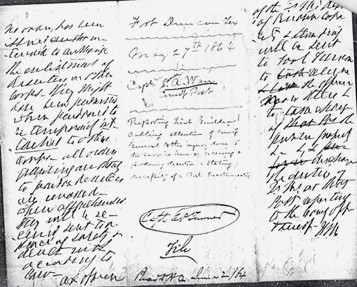 Original
Fort Duncan, Texas
May 27, 1864 Captain James A. Ware Commander of Post Reporting Lt. Guilden – calling attention of Commanding General to the injury done to the service having receiving and pardoning deserters and stating receipt of a Post Quartermaster 173
No order has been issued intended to authorize the enlistment of
deserters in other corps. They might have been permitted when
pardoned to be temporarily attached to other corps. All orders
granting anyone to pardon deserters are revoked. When apprehended
they will be secured and sent to a place of safe conduct and dealt with
according to law.
By June, both James and Jane must have been feeling the full brunt of a hot Texas summer. Jane was now seven months pregnant and still living in Corpus Christi. James was stuck out on a barren section of land at Fort Duncan where living conditions went from sad to pathetic. As one author wrote: “The lack of 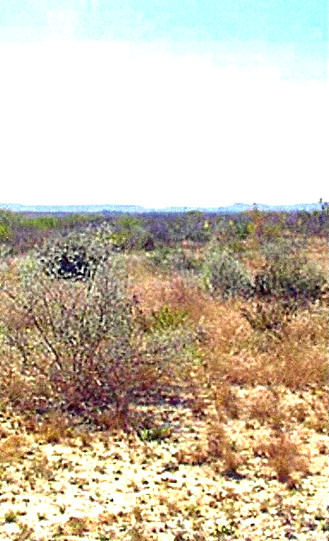 Nueces Strip
Photo by Susan Dial (756)
of clothing continued to be one of the most serious problems facing the
regiment. One company on the Rio Grande was said to have been
‘almost naked’ and in bad need of shirts, drawers, socks, and
particularly pants. Many of them were simply refusing to do
service in their ‘nude condition.’” (Ref. 3347)
174 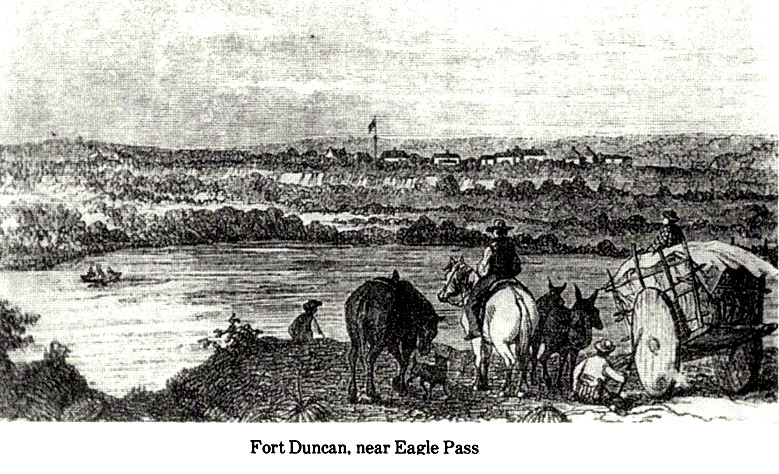 (Ref. 756) “Summers at Fort Duncan (Eagle Pass)
were blistering, with the temperature sometimes hitting 107 degrees in
the shade. Ringgold Barracks (Rio Grande City) was also miserably
hot.” (Ref. 756)
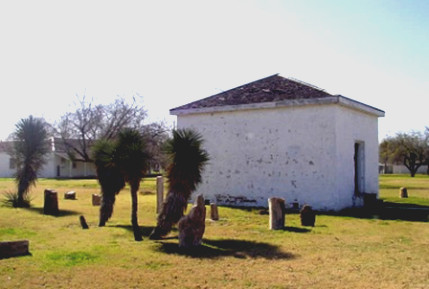 Fort Duncan (Ref. 756)
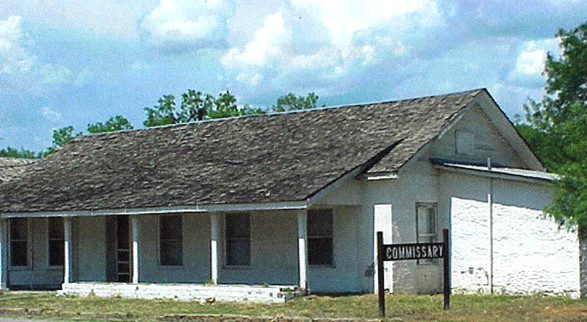 Fort Duncan commissary: photo courtesy of Eagle Pass Chamber of Commerce 175 Fort Duncan was very important to the Confederacy
because of the export of cotton. The collector of Customs wrote
in 1864 that, at one time, “the whole river bottom from the bank of the
river to the edge of the town was covered with cotton.” It was a
miserably hot and desolate post to be assigned to, however, and
although some other forts tried gardening to augment food supplies, the
effort failed completely at Fort Duncan.
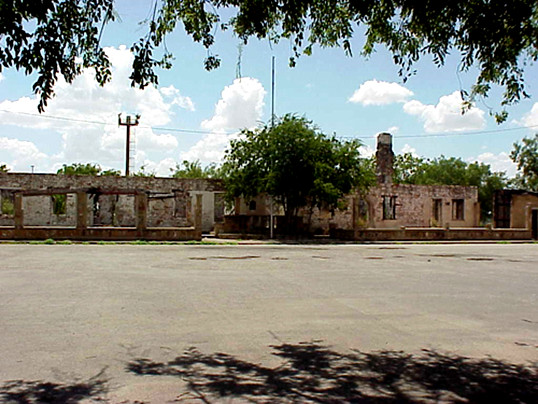 Now called Fort Duncan Park, the site was listed in the National Register of Historic Places in 1971. The site contains a dozen buildings, including a stone magazine, stone stables, and adobe officers’ quarters. The old headquarters building now serves as a museum. 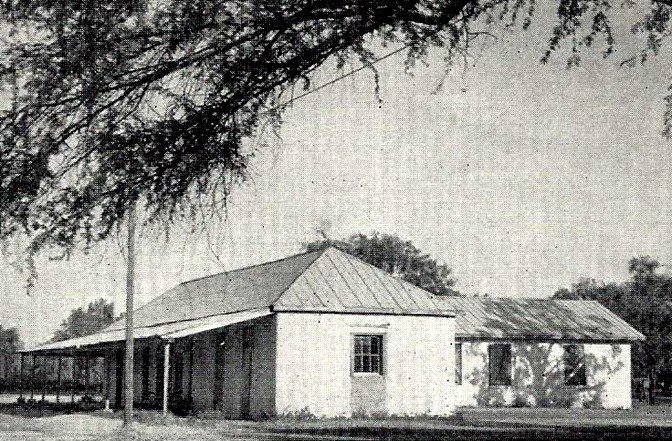 (Ref. 3345) Fort Duncan 176 In June, the small fort became a center of
unwanted activity. “On June 17 a band of forty guerrillas crossed into
Texas five miles above Eagle Pass, ‘unfurled the United States flag’
and during the next day were reported to have ‘received a considerable
augmentation to their number from the Mexican side of the
river.’ The new commander at Fort Duncan, Captain James A.
Ware, having only thirty-four men at the post, called out a home-guard
militia company. Ware placed guards in the post hospital, at the
customs house, the quartermaster’s store house, several business houses
below the town, and sent fifteen men north of town to patrol the
countryside in the direction of the expected approach of the
enemy.” (Ref. 3347)
On June 20, 1864, James sent the following
letter to headquarters. In the letter he addressed the warning
signs of the impending attack and the events as they unfolded.
HEADQUARTERS, FORT DUNCAN, June 20, 1864.
SIR:
I have to report that for some two or three days past I have received
instructions that a strong body of renegades would cross to this side
of the Rio Grande and make an attack on this post. On the morning of
yesterday, 19th instant, at 1 a.m., a force of renegades, of about 40
in number, attempted to cross the river at a point 3 miles above this
place; finding, however, this ford impracticable, they subsequently
effected a crossing about 5 miles higher up and immediately commenced a
march on this place, receiving a check from the pickets. They retired
to a position 6 miles from here and unfurling the United States flag
received a considerable augmentation to their numbers from the Mexican
side of the river during the day. Having at my disposal for the defense
of the post but 34 men, and about half of them unprovided with arms, I
called into service for the occasion Captain Stone's home guard
company, commanded by Lieutenant Burke, receiving thus a re-enforcement
in numbers, but badly armed, having but about twenty-five arms in the
company of all kinds. I placed in the hospital building of the post a
detachment of Captain
177
Pickerell's company of 25 men, a detachment of 6 men well-armed in the
quartermaster's store-house, a portion of which had been used as a
small-pox hospital. Captain Stone's company I placed to guard the
custom-house and business houses of the city, placing pickets north of
the city, and a strong guard, under the command of Captain McFadden, in
the direction of the enemy. My force was too weak to enable me to
picket properly, but to meet the same end I ordered all men to sleep at
their posts on their arms. About 1 a.m. the attack was made by a force
numbering, from the best information at my disposal, from 80 to 100
men, on the garrison, and on Captain Pickerell’s company, who were
compelled to abandon the house, after defending it with a gallantry
that is fully attested by the marks of the contest on the doors and
windows and walls of the house, and the loss of 5 men severely wounded.
I regret to state that his company lost their horses and nine guns; to
us a priceless loss. At this point I collected a few stragglers of the
garrison and made preparations to defend the quartermaster's building.
The enemy, however, marched to the attack of the town and were repulsed
- the streets having been barricaded with cotton and the attack being
weakened in spirit by the desperate resistance at the hospital. The
enemy, after stripping their prisoners of arms and valuables, retired.
I cannot commend too highly the gallantry displayed by Captain
Pickerell and his company in the defense of the hospital and subsequent
conduct in connection with the home-guard company.
In attempting to communicate with the forces in the town, I, in
company with Mr. Woodward, a clerk of Major Russell, after the repulse
in town, fell into the hands of the enemy, from whom I succeeded in
making my escape. They released the balance of the prisoners upon
retiring. They are still receiving re-enforcements and threaten us yet
more seriously, and I regret to have to state that the conduct of the
Mexican officers has been decidedly unfriendly in this emergency. They
have permitted this force to form on their territory, and have rejected
my request for the loan of a few stand of arms to repel them. They have
refused to let our citizens and friends in Piedras Negras cross the
river to come to our assistance. I have represented to headquarters
frequently the necessity of placing a
178
proper garrison at this post, and must conclude that they have not the
troops to furnish, or some attention would have been paid to my
request. During the period of a few hours of my separation from the
command, consequent upon my capture, Captain McFadden made more
efficient arrangements, aided by General E. B. Nichols and other
citizens, to provide against any further ill consequences of another
attack.
In haste and with respect, your obedient servant,
JAMES A. WARE, Captain, Commanding Post. Lieut. BART J. DEWITT, Post Adjutant, San Antonio. Two days later, James also sent his report to General Slaughter.
Assistant Adjutant-General
HEADQUARTERS LINE OF THE RIO GRANDE, Laredo, Tex., June 24, 1864. Brigadier General JAMES E. SLAUGHTER, Chief of Staff: EAGLE PASS, June 24, 1864 DEAR COLONEL: On Sunday night last I was attacked by about 80 renegades. Having previously been told that knowing the weakness of my garrison they would make the attack, I had called out the home guard for duty in the town and made them sleep on their arms. I posted Pickerell's company in the hospital building and ordered them to sleep on their arms. I sent a patrol of 15 men, with instructions to patrol the country in the direction of the enemy at a distance of not over 1 to 2 miles from the town. A patrol was also put out below the town. I posted also a detachment of a few men in the commissary building, the strongest building in the garrison. I had been informed 179
that they numbered from 35 to 40. They eluded the vigilance
of my patrol, passing by them, and from the manner in which they
entered the garrison I am satisfied that they were led into it by a
traitor. They made an immediate attack on Pickerell without
halting a moment to reconnoiter, and drove him out without being for a
moment checked by his fire, which was reserved until they were close
up. When the first shot was fired I started with 4 men, who were with
me, to Pickerell's assistance, but the house was carried so quickly
that it was impossible to render him assistance. I called in the
guard from the guard-house and collected several of the stragglers and
placed them in the commissary building, and sent orders for the home
guard to engage them from the arroya. Awaiting their attack, or
the further attack of the enemy on the garrison, I heard a few shots
fired from the town and then much shouting, but whether from the enemy
or from our own men I could not tell, and sent again to learn the
reason of my not being supported and what had occurred. Neither of my
couriers returning, I grew uneasy about what was transpiring in town,
and determined to ascertain in person, and for that purpose took with
me young Woodward and attempted a reconnaissance of the enemy's
position and operations, and near the hospital, deceived by the voice
of one of the enemy, was captured by the guard they had left at the
hospital. Learning there from several of our own men who had been
taken prisoner, that they had taken the town without a shot in its
defense, and seeing an opportunity of escape, I availed myself of it
and reached the little garrison at the commissary. Here I waited
an attack until just before daylight, when learning nothing to
contradict the statement that they had taken the town, and considering
a useless sacrifice of my small detachment to await an attack by
daylight, as I was out of the reach of any re-enforcements, I withdrew
my men from the garrison, and sent across to Piedras Negras for the
purpose of collecting refugees from the town and garrison. In a
short time I learned that the town was still held by the home guard,
and after a slight demonstration the enemy had returned without doing
any injury to property or burning any cotton. It was the
intention of the enemy to collect a large force of renegades under U.
S. officers in the vicinity of this point last Thursday. This
plan has been made for months. They expected to assemble from
180
700 to 800 men, but succeeded only in getting together 150, and I think
have now abandoned the attempt.
After the attack on Sunday night they received accession of numbers from Mexico. The citizens from both sides of the river rallied to the defense of the place and the cotton, and on Tuesday night the enemy made another demonstration against the town, not, however, numbering over 50 men. We had some skirmishing without results on the outskirts of the town. Hudson's mounted company having come in the night, I sent them, with all the men I could mount, to pursue them. They were about 4 miles behind them when last heard from. The larger portion of the renegade force was organized and marched from the Mexican side of the river. The authorities have taken no effective means of arresting re-enforcements to the renegades, but have stopped our citizens from crossing to our assistance. My garrison in the hospital building was badly armed, many of the men being entirely without arms - the arms for Pickerell's company having been sent to Laredo. In the engagement of Sunday night Captain Pickerell lost several of his horses and 4 men severely wounded. Of the enemy 1 was killed and 6 wounded. I regret this occurrence, though I could not have made arrangements, in view of my numbers and information, to have avoided a surprise more efficient than those adopted. If I had, cannot flatter myself that the result would have been different and had my instructions been strictly executed we might have gained earlier intelligence of their approach. I have constantly notified the authorities at headquarters that my force was entirely inadequate for the protection of the post.
Respectfully, your obedient servant,
JAMES A.
WARE.
Col. JOHN S. FORD (REF. 837, 2069)
James also sent an official report to Captain E. P. Turner, dated June
24, 1864.
181 Filed under June 20,
1864 Affair at Ft.
Duncan, Texas
June 24, 1864 Captain E. P. Turner AAG Captain - I have the honor of reporting for the information of the Major General Commanding the series of occurrences transpiring within the last week affecting this post’s garrison. On Saturday last I had received information that I would be attacked certainly within a very few days by renegades. I made what disposition I could to hold my post - my garrison, at the time, consisting of 21 men of Captain Pickerell’s Company Exp. Forces, and seven men of Company F, 1st Texas Cavalry. I recalled another detachment of Pickerell’s company which was, at the time, herding horses some miles from town - being an augmentation of 12 men to my strength. Of this force, 19 or 20 were provided with arms but of a very inferior character. The Home Guard I put on duty in the town barricading the streets with cotton bales and placing a few sharpshooters on a flat roofed building in a commanding position in the town. The force was too small and too badly armed to admit of my thoroughly picketing the post, consequently I only placed pickets and a patrol on the side of the town in the direction of the enemy, and on Sunday morning at 6 a.m. a force numbering from 80 to 100, having eluded the vigilance of my pickets and patrol made an attack on the Hospital building occupied by the detachment of Pickerell’s Company, about fifteen of whom were armed. The attack was made with such vigor that the house was carried without a check from the well directed and resumed fire of those comprising the garrison who had been ordered to strap on their arms. At the time of the attack, I was at my quarters with four men, about one hundred yards from the building, and attempted to reach the house but it was carried so quickly that I only arrived in its vicinity to be a witness of its’ fall. I succeeded in rallying a few fugitives and calling the Guard from the Guard House. I threw them into the Commissary building believing I could make a stout resistance and sent orders to the officer commanding the Home Guard to open fire on the enemy from the 182 arroyo north of the Garrison. My courier failed either to deliver
the order or to report to me afterwards. I sent a second with a
like result and, becoming uneasy about the fate of the town, I
attempted in company with Mr. Woodward (clerk in Major Russell’s
office) to make a reconnaissance of the position of the enemy and to
reestablish my communication with the town. In doing, I had the
misfortune to fall into their hands and the good fortune to make my
escape before they discovered my identity. During my temporary
detention, I was told by many of our prisoners in their hands that the
town had surrendered without giving a shot, not willing to risk another
man from my diminished numbers, having already lost three in my
endeavors to establish communication with town and having every reason
for believing the town had fallen. I waited until the approach of
daylight would have disclosed the --- of my garrison and
not considering it advisable to sacrifice the only --- for assembling
the command and refugees of the town withdrew them from the garrison
and took a position about a half mile from the town and sent in
different directions to collect the fugitives. The enemy however,
having suffered severely in their first attack, losing one killed and
six wounded, hesitated to make their attack on the town and retired
from its vicinity a short time afterwards, releasing their prisoner and
carrying off their dead and sick. I immediately made preparations
to receive another attack, closed all business houses and suspended all
business placing every man in the ranks and ordered the purchase of and
collection of horses and made breastworks and barricades of cotton
bales. On Tuesday night we were again much annoyed by them
continually during the night driving in my pickets and skirmishing
through the suburbs of the town. Before daylight I had succeeded
in providing a sufficient force under charge of Capt. Hudson which
pursued one of the parties to a point sixty miles above here where he
succeeded in surprising them this morning and dispersed them, capturing
their horses and men. Capt. Pickerell was severely wounded in
this engagement. There was no intention that the assailing party
should be 700 or 800 strong as it was. It was under the command
of officers of the U.S. Army sent for by Ke(?).
Respectfully sent, your Obedient Servant,
James A. Ware Captain Commanding Post (Ref. #2076) 183 For some reason, Colonel Santos Benavides (who
had only heard rumors of the attack) sent a presumptive note to General
Slaughter on June 24th himself. Not knowing the real facts, he
mentioned that he had just received his news from “a reliable person
who has just arrived . . . from Piedras Negras.” In his message
he incorrectly stated to the general that the bandits “went into town
and took possession of it.” He also wrote incorrectly that this
same source reported that “Captain Ware commanding that post abandoned
that place during the night of the attack but he returned next
morning.” One can be sure that James did not take lightly these
unwarranted criticisms against his character. He wrote an
emphatic letter to Headquarters on July 1, 1864, making his position
clear.
Santos
Benavides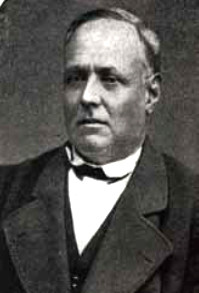 It is also interesting to note that the
relationship between Benavides and Colonel Ford (the commanding officer
over James) was at different times “strained,” to say the least.
At the beginning of 1864, "Santos had written to Colonel Ford and
promised to 'strictly obey' any orders. But almost from the
beginning of the war, Ford had a difficult time dealing with Santos’s
independence and the Laredo colonel's reluctance to cooperate.” (Ref.
3346) Colonel Benavides was a gifted and valuable officer
for the Confederacy, but he was often overly ambitious in his methods
to try and attain a promotion. One of the few things that stood
between him and a general’s rank was a lack of men. When Ford
“learned that Santos had authorized one of his officers to recruit men
from Colonel Ford’s command, men whose terms of enlistment were
expiring, Ford was furious.” (Ref. 3346)
The following excerpts from a wonderful book by Jerry Thompson provide further insight into the tensions between the two high ranking officers: (Ref. 3346) 184
“According to Colonel Ford, the troops at Laredo were performing little
or no duty, were sleeping in their own houses, and were seldom
attending roll call or dress parade. Santos had remained absent
from his post for two months without orders, Ford asserted. In
addition, Santos had seized cotton from the cotton bureau, crossed it
to Nuevo Laredo in the night, and sold it. Money from the sale of
the cotton had been used to pay officers in Laredo, whereas officers in
the lower valley had not been paid in months. To complete his
regiment, Santos mustered into his cavalry men who were already in the
infantry. Perhaps more seriously, Santos was guilty of disobeying
orders and even 'encouraging desertion’.” (Ref. 3346, 3347) Ford
told Santos he would be reported for disobedience of orders.
“When Colonel Ford learned that Santos was seizing Confederate cotton,
he accused Santos of 'doing things with a high hand.’ Ford was
not alone,’ he said, in believing that public property was not safe in
the hands of Colonel Santos Benavides. Ford asked General
Magruder to have Santos arrested. The second week of October 1864, Ford
heard that Santos was refusing to recognize any orders from him, and he
pleaded again with headquarters in San Antonio to have Santos
arrested. The confrontation between Ford and Santos peaked in
September and October 1864, with Santos’s continued attempts to recruit
enough men to fill his regiment and obtain the appointment of brigadier
general.” (Ref. 3346, 3347)
The situation was so bad that “On September 2, 1864, Ford sent
two threatening letters to Benavides and the situation ended up with
Santos being arrested and having as some of the witnesses against him
being his Uncle Basilio, brothers Refugio and Cristobal, as well as
others.” (Ref. 3346, 3347)
The friction continued to such a degree that
“in November 1864, General James Slaughter arrived in the lower valley,
and he set out to resolve the seemingly endless feuding and determine
the organization of the Western Sub District.” (Ref.
3346) His ultimate solution came as a decision of
"dividing the Rio Grande frontier into two sub-districts. Ford was
to command the lower valley while Benavides was given command of the
area from Rio Grande City up river to Eagle Pass.” (Ref. 3347)
This provided some relief to the immediate problem. At a later
date, there were several generals
185
who actually recommended promotion for Benavides to Brigadier General,
but Colonel John "Rip" Ford was against such a decision. In his
waning years, an elderly Ford generously praised Santos on his service
in his memoirs, but “Santos, however, never quite forgave Ford . . .
whom he blamed for his never becoming a general.” (Ref.
3346) The relationship between Ford and Benavides
could make one pause to wonder if that was not part of the reason for
Santos rushing to judgment on the raid at Fort Duncan. James
certainly did not hesitate to make sure the truth reached headquarters.
HEADQUARTERS, Fort Duncan, Tex., July 1, 1864
Maj. A. G. DICKINSON: DEAR MAJOR : Yours from Houston has been received, and I take advantage of a leisure moment to write you a few lines. I am prompted to do this by an intimation in a letter from San Antonio and by an implied reflection on me in the San Antonio News with reference to the attack made by the renegades on this post on morning of the 20th. I am at a loss as to what the particular character of the charges against me may be. You are where you will hear them if made, and I will state all of the occurrences of the night exactly as they occurred as I have been able to ascertain upon minute inquiry since, and ask your opinion and advice as to my course of conduct and what I should do, or, in other words, if the imputations are of such a character that you would, if in any place, demand a court of inquiry. You are aware that since I have been at this post I have constantly, even at the risk of vexing the patience of the general, urged the necessity of a garrison both stronger in numbers and made up of different materials than what constituted the command at this post. On Saturday night I received an intimation that an attack on the post was in contemplation, and made the best arrangements I could to meet 186
them. They had not then crossed the river. I sent pickets
to watch the crossings. About 1 a. m. a report was brought me
that they had attempted a crossing two miles above the town, but
finding the ford impracticable had gone above. I advanced the
pickets a little, andsent to the country for the horses of the
garrison, which were at herd six miles in the country. About 4 a.
m. Sunday morning my pickets came in, having met the enemy coming down
the river on this side, fired on them, routed them, and captured one
horse, saddle, and bridle. At 8 a.m. I received a communication
from the Mexican commandant with information that another party about
thirty-five strong had crossed. I waited upon the Mexican
commandant, and demanded that he should join me in hunting them out,
and pursue them regardless of national boundaries, proposing to him to
send with me an equal number of men. This he would not consent
to, but stated that when driven to that side of the river he would
arrest and deliver them to me. My object was to get the use of
the Mexican arms, as I could not arm more than twenty-five men.
The courier sent for the horses did not find the camp until late in the
day.
On Sunday night I called out the home guard, mustering at the time about sixty men with about twenty of them armed, and a few citizens, barricaded with cotton bales the street, and placed the citizen soldiers behind the barricade. I selected fifteen men for a picket guard, and knowing the position of the enemy and that they could only approach me in a certain direction, I placed the whole picket guard on that approach, with strict orders to place vedettes along and patrol the whole night a line leading from a certain point to the river, and not on any account to extend that line or the patrol to a greater distance than one mile from the town. I stationed the forces in the garrison in the buildings which I was occupying, the one as hospital, the other as commissary and small-pox hospital. My garrison consisted of thirty-four men all told. I left four men to hold the small-pox hospital, as I could not leave the patients to the mercy of the renegades. I stationed the rest at the other hospital, with horses saddled and bridled, and men sleeping on their arms, with sentinels. Captain Pickerell sent a small scout down the river. I remained myself at my quarters about equidistant from the hospitals. 187
My picket guard, with more zeal than discretion or respect for orders,
instead of remaining as directed, started on a scout of their own
toward the enemy's camp on Elm Creek, six miles oft'. In their
absence the enemy passed their line and rode into the garrison without
the alarm being given. When discovered by the sentinels and by
others at the hospital, against which they directed their course, no
alarm was given. Captain Pickerell called up his men who were
asleep in the gallery, called on them to be steady and reserve their
fire. The officers in charge of the assailing party dismounted,
walked up to the gallery, and demanded its surrender in the name of the
United States. Pickerell replied with a shot, and a volley was
poured into the house by the enemy. But few of Pickerell's men
stood the fire, and he was left almost without support. The house
was abandoned to the enemy almost without a struggle. The enemy
lost 1 killed and 6 wounded; Pickerell, 15 wounded, all of whom are
doing well. Being at my quarters and having with me two men, I
started for the hospital at the first fire, but only came near enough
to hear the surrender of the house. I collected several of the
stragglers and the guard and placed them in the commissary building,
expecting an immediate attack, and sent orders for a portion of the
home guard to engage the enemy from the arroyo. I heard no return
from the message, and having every reason to apprehend the surrender of
the town, I started myself to establish my communication, when
(approaching a party of the enemy and deceived by a similarity of voice
to Captain Pickerell’s) I, in company with Mr. Woodward, who was with
me, were made prisoners. While a prisoner I was told by many
other prisoners that the enemy had complete possession of the town, no
resistance having been offered. An opportunity offered for escape, and
I availed myself of it, and still not being able to get anything
certain from the town, just before daylight (not willing to sacrifice
what I considered at the time the only nucleus for re-collection of the
command) I withdrew to a short distance from the town and sent men out
to collect the stragglers and refugees. At daylight I discovered
that the town still held out and immediately went to it. The
enemy had made no attack after that on the hospital.
188
I write you these particulars. They are the exact facts. If
I have committed an error, I will meet the consequences. If not,
I do not wish to suffer for the consequences of the delinquencies of
others. This subject has taken so much room that I have neither room
nor time to write on other subjects. My kindest regards to Mr. D.
Yours, truly,
JAMES A. WARE *** A
vedette means a mounted sentinel stationed in advance of pickets
This letter from James was met with a complimentary endorsement to
headquarters from Major Dickinson.
Respectfully forwarded for the information of the major-general commanding, as the official report is not a defense of Captain Ware's course, which has been somewhat censured. Captain Ware is a devoted and zealous officer, although the result of this raid is somewhat embarrassing to a young and ambitious officer. He has long required men and ammunition, was fully conscious of those requirements, and pressed them upon district headquarters. The immense draft, however, for troops upon the district to be sent to Louisiana and Arkansas prevented reenforcements at that point. The weak condition of the post resulted in the raid. I believe Captain Ware used every means in his power with the material in hand, and made as good disposition of his forces as the number would allow. I hope, therefore, that his course will not be censured at district headquarters. There appears to have been no further follow-up that
was done, and James continued to command the forces at Fort
Duncan. The conditions there only deteriorated more with each
passing day. In a strongly worded letter to Captain Turner,
written on July 8, 1864, it is easy to sense James’ growing frustration
and aggravation over
189
the neglected care of his troops. He had been sending request
after request for supplies for his men – only to have them denied or
ignored. It was growing increasingly hard to fight the enemy
without any weapons or ammunition. The men were weakened, getting
sick, and their living conditions did little to protect them or keep
their morale up.
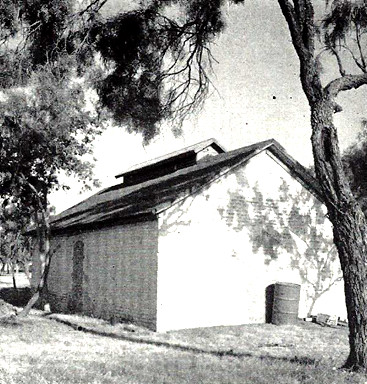 (Ref. 3345) 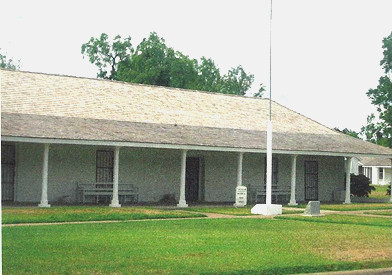 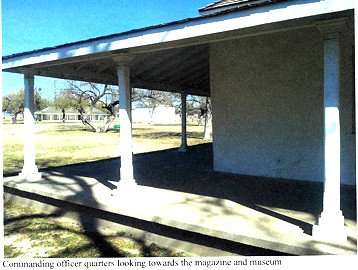 Current photos of Fort Duncan 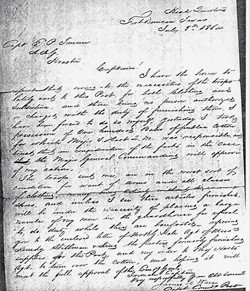 Original letter from James 190
Unfortunately, his request was denied again.
On July 15, 1864, James sent another letter to Headquarters requesting help. 191
Headquarters Fort Duncan, Texas
July 15, 1864
Lieutenant John A. Wallace AAA General Lieutenant, I have the honor of reporting for the information of the Col. Commanding that I have had intelligence from the other side of the river which, though not entirely authenticated, is positive and from a source from which I have always been able to get information which, with no greater authenticity, has almost invariably been verified by events. The present information is that the renegades have collected near Fort Hudson in some number for the purpose of making another attack in this place between this and 20th instant. My informant states that they numbered (some four or five days since) one hundred and fifty and were expecting reinforcements from the interior of Texas and also three hundred men from Eagle Pass. The party, at present assembled, is under command of Houston, a nephew of Harris, and are reported well armed and mounted. It is difficult to reconcile the presence of this body of men there with the difficulty of sustaining themselves so far from supplies. The renegades have disappeared from Piedras Negras for now four or five days. I would call the attention of the Colonel Commanding to the necessity of sending more arms and ammunition. One hundred stand of arms should be sent here for the use of the Home Guard. Thirty stand would be sent here for the use of Captain Pickett’s company and that it is necessary to impress transportation in the stages. Neither Captain Glenn’s nor Captain Carrington’s companies have as yet reported.
Respectfully,
Your Obedient Servant, James A. Ware Captain Commanding Post 192 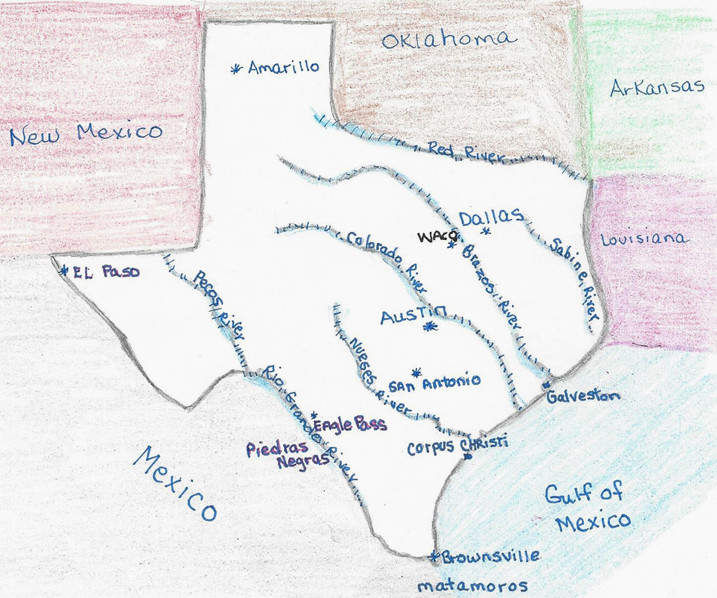 Map of Texas showing the places relating to James and where he served during the war.
All during that long, hot summer of 1864, James was facing danger,
frustration, deprivation, and military challenges on a daily
basis. Jane, on the other hand, was in the last months of
pregnancy with her third child. Each was worried about the other,
and the merciless Texas heat could be almost unbearable for both of
them.
August would find many changes on the horizon for James on the military front. There was a major “shake up” in authority on August 4, 1864, among all Confederates soldiers in Texas. On the first day of the month, Major Nolan was reelected to county sheriff, and by mid-August, General John B. Magruder was replaced by General John G. Walker as Commander of the District of Texas, New Mexico, and Arizona. In Brownsville, Brig. General James E. Slaughter was assigned to command the Western Sub District, replacing Major General Hamilton Bee. James was in the process of leaving his current assignment near Eagle Pass and heading toward the coastal region of Texas. On August 8th, he wrote the following note to Captain E. P. Turner. 193 Texas August 8, 1864 Captain E. P. Turner, A.A.G.
Captain,
I have the honor to report the receipt on Sunday 31st ultimo of Special Orders #208 Par, Texas. I would state for the information of the Major General Commanding that I have learned there were many men from my command (1st Texas Cavalry) in the vicinity of Goliad, San Patricio, and Corpus Christi, and a few on the lower Rio Grande and I have already sent a portion of the detachment of my Regiment with me to collect those in the vicinity of Corpus Christi of my own company. I would respectfully ask that an order be issued requiring the absentees from the regiment who may be in the district to report to me, to return to the regiment at some point to be selected by the Major General commanding and at some fixed date giving time for the order to reach those at a distance. Respectfully, Your Obedient Servant, James A. Ware Captain, 1st Texas Cavalry (Ref. 2180) Sadly, before he could get underway, he had to
send another message explaining why his departure would be
delayed. He had become severely ill and had been confined to his
bed in order to recuperate. The following letter explains this further.
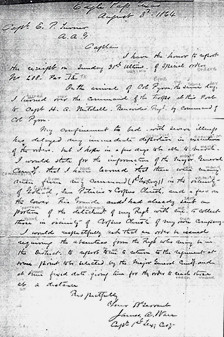 Original letter See transcription of letter James wrote on August 8, 1864, to headquarters below. 194
Eagle Pass, Texas
August 8, 1864 Captain E. P. Turner, A.A.G. Captain, I have the honor to report the receipt on Sunday 31st ultimo of Special Orders #208 Par, Texas, on the arrival of Colonel Pyron the same day I turned over the command of the troops of this Post to Captain H. A. Mitchell - Benavides Regiment by command of Colonel Pyron. My confinement to bed with severe illness has delayed my immediate departure in execution of the orders, but I hope in a few days to be able to march. I would state for the information of the Major General Commanding that I have learned there were many men from my command (lst Texas Cavalry) in the vicinity of Goliad, San Patricio, and Corpus Christi, and a few on the lower Rio Grande and I have already sent a portion of the detachment of my Regiment with me to collect those in the vicinity of Corpus Christi of my own company. I would respectfully ask that an order be issued requiring the absentees from the regiment who may be in the district to report to me, to return to the regiment at some point to be selected by the Major General commanding and at some fixed date giving time for the order to reach those at a distance. Respectfully, Your Obedient Servant James A. Ware Captain, 1st Texas Cavalry (Ref. 2180) In many ways, the illness that struck James in August was like a signal for the beginning of the end. Less than one year later, the Wares would find themselves entering a new phase of life. 195 196 |
|
This site maintained by John Reagan |